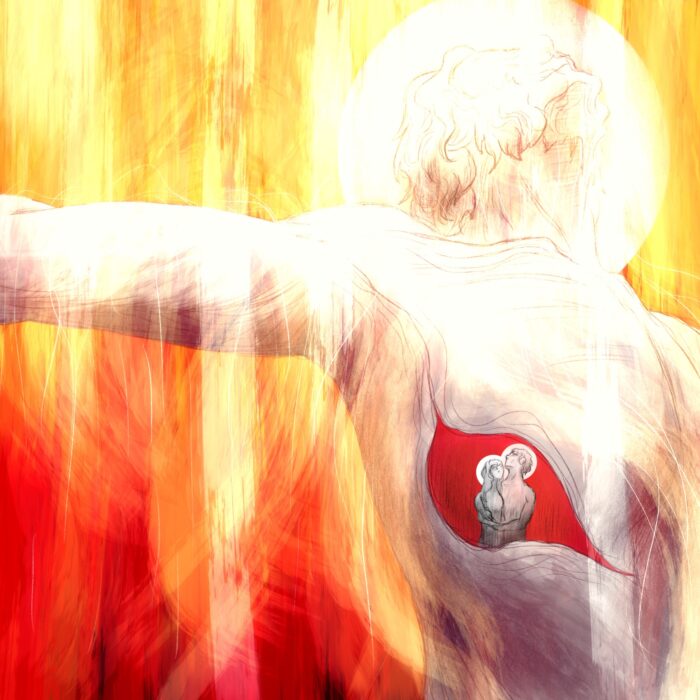
Nahum 1:6-7, “Who can stand before His indignation? Who can endure the heat of His anger? His wrath is poured out like fire, and the rocks are broken into pieces by Him. YHWH is good, a stronghold in the day of trouble; He knows those who take refuge in Him.”
The first thing to note is that Nahum presents YHWH’s outpoured wrath as the enactment of the facet of His character declared in the phrase, “[He] will by no means clear the guilty” (1:2). What does it mean for YHWH not to clear the guilty? There are those who would argue that it means He will not hold back the fitting consequences of sin. Now, in some sense and in certain instances, that is certainly true (i.e., He forgives David his sin with Bathsheba, and yet thousands still die for it and the child dies as well).
However, if we take the entirety of revelation into account, the punishment due the guilty is not simply temporal and specific consequences for sin, rather, it is final exile from the presence of God, it is true death, it is to be under His wrath (Ex. 32:33; Rom. 6:23; Eph. 2:1-3; Jn. 3:36). Thus, if YHWH does not clear the guilty ultimately means that He will pour out His wrath on the guilty, that He will damn the guilty. And that is exactly what Nahum implies in verses 2-3ff. In jealousy for His Name, YHWH is going to pour out wrath and vengeance on His enemies because “[He] will by no means clear the guilty.” This is the wrath that Nahum so graphically portrays as divine fire that shrivels its adversaries, shakes the earth, melts the hills, and shatters the rocks (v.5-6).
Now, it must also be noted that this outpouring of wrath is by no means inconsistent with YHWH’s goodness (which, ultimately considered, is His love). Directly after expounding the effects of the Lord’s wrath, Nahum declares, “YHWH is good!” Indeed, Love’s holy war of wrath against God’s enemies is a communication of His own Character (compare Nah. 1:2 and Ex. 34:7), which is to say, of “all His goodness” (Exodus 33:19). God’s wrath is not the supernatural tantrum of a capricious deity, it is not an overmastering passion that seizes Him and drives Him to do terrible things. No, His wrath is a harmonious communication of His goodness, just as surely as are His steadfast love and faithfulness. Indeed, He includes His wrath (in the phrase, “who will by no means clear the guilty”) in the paradigmatic OT exposition of His Name. I’ve said it in here before, but just as a husband’s violent defense of his wife from an attacker is an expression of his love for and commitment to her, so too YHWH’s consuming wrath against His adversaries is an expression of His love—which, ultimately considered—is love for Himself within the Trinity (and all those whom, by grace, He has gathered into this Triune fellowship).
But there is something else that expresses YHWH’s goodness, and that is Nahum’s main point in mentioning that YHWH is good in verse 7, namely the fact that He is “a stronghold in the day of trouble.” So, YHWH is good in the outpouring of His wrath against His enemies AND He is good in becoming a stronghold for all who will seek refuge in Him. The question must be asked, seek refuge from what? Well, verse 8 shows the flip side of taking refuge in YHWH as stronghold, and there we see that His enemies (by implication, those who do not seek refuge in Him), we see that His enemies are overtaken and destroyed by the Lord Himself…..So, on the one hand, there are those who seek refuge in YHWH and are preserved, on the other, there are those who—presumably—do not take refuge in Him and are destroyed by Him. This, coupled with the vivid descriptions of the Lord’s wrath in verse 6 seems to imply that YHWH is a refuge and a stronghold from Himself; that is, from His own wrath.
What we see is that, in perfect goodness—which is to say, as an expression of His Name—YHWH pours out wrath on His enemies, v.2-6 (of which, scripture would teach, all people ultimately are a part, Rom.3:9-18), and yet—also in perfect goodness—YHWH Himself becomes a stronghold from His wrath to all who will seek refuge in Him (v.7-8). How can this be? How can His goodness—His Name—be expressed both in the outpouring of wrath on His enemies and the covering from wrath for those—also enemies, former enemies at least—who seek refuge in Him?
The answer is—of course and gloriously—Jesus Christ. In Christ, and at His cross, both of these harmonious facets of YHWH’s Name are infinitely proclaimed to creation.
First of all, in Christ the enemies of God are obliterated under His wrath. Who can stand before His indignation? Who can endure the heart of His anger? Who can bear divine wrath poured out like fire so that it shatters the rocks and melts the hills? Jesus Christ. He stood before this, He endured this. And, just as the rocks of Calvary were split at His death (Matt.27:51), so too Christ Himself—the Rock (1 Cor. 4:10)—was split under the rod of divine wrath such that water gushed out and gave life to a barren world (Is. 48:21, Jn. 19:34-37). Yes, Jesus is made a complete end of at the cross, He is pursued into darkness (Nah. 1:8), exiled under the curse (Matt. 27:46), crushed by God in the place of YHWH’s enemies (Is. 53:3-6). He becomes the enemy (2 Cor. 5:21; 1 Peter 2:24), He becomes the cursed one (Jn. 3:14-15; Gal. 3:13), and He bears the fully outpoured wrath in the place of His people, declaring once and for all that YHWH is a God who will by no means clear the guilty (Rom. 3:23-26).
And secondly, it is precisely in this climactic crushing of His enemies in the flesh of the Beloved Son that YHWH shows Himself to be the stronghold of all who take refuge in Him. Yes, because it is YHWH Himself up there on the cross, YHWH Himself bearing the wrath of YHWH. Just as the walls of a stronghold bear the assaults of the attacking force and so preserve those within, so too YHWH Himself endures on the cross the fires of holy indignation for all those who have fled to Him for refuge. Just as Moses was preserved from the manifest glory of God by being hidden in a cleft torn into the mountain’s rocky side, so too we are preserved from the outpoured wrath of YHWH only by seeking refuge in the His own torn side. In vicariously becoming the enemy of YHWH who bears the wrath of YHWH, The beloved Son has also become the refuge for all the enemies of YHWH who will abandon their rebellion and come trembling to Him alone as their stronghold and defense and salvation.
At the cross, YHWH incarnate declares the Name of the God who will by no means clear the guilty by becoming the guilty who are justly crushed under Love’s holy war. And, at the cross, YHWH incarnate declares the Name of God who is abounding in steadfast love and faithfulness and who is a stronghold for any and all who would come to Him by swallowing up, in our place and as our God, the wrath that we deserved. And, because of this, the Crucified Jesus Christ is raised from the dead and seated on high and recognized by all of creation to be the all-defining, universe-harmonizing, infinitely perfect revelation of YHWH—to the glory of God the Father (Phil.2:6-11).
Hallowed be His name!


